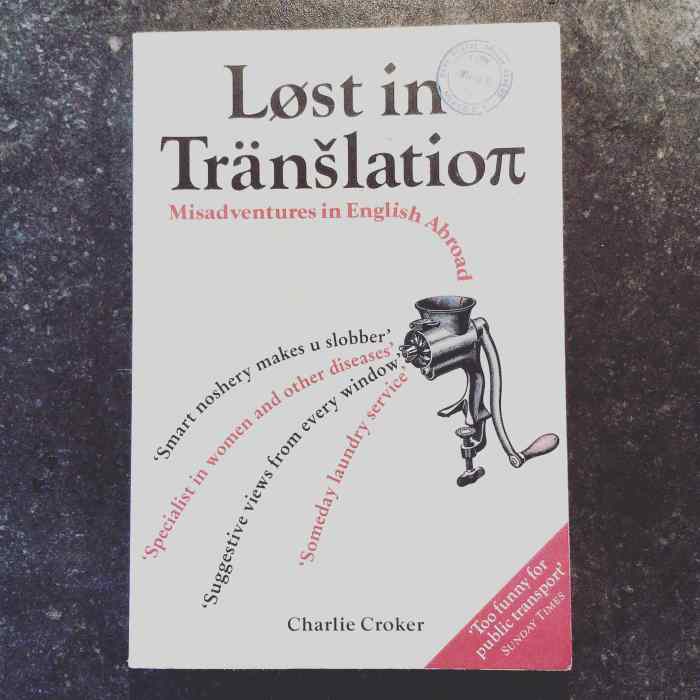
Lost in Translation: Misadventures in English Abroad (2006) was lent to us by a colleague. How nice, eh? Which is good, as we love this type of thing.
Think of it like the newspaper typo-fest A Steroid Hit the Earth. Except this one is about “grammar-gargling” around the world as countries attempt to translate English into X language.
It’s particularly famous in Asia, where translating English seems to be fraught with difficulty. The results are cute, funny, bizarre, and very entertaining.
Lost in Translation by Charlie Croker
“Amused as we are by other nations’ fumbling with our language, we should never forget their English is infinitely better than our Thai/Polish/Vietnamese. Indeed, sometimes it’s better than our English—you’ll find several examples in these pages from English-speaking nations, whether from the land of Shakespeare or the Land of the Free.”
An important bit of clarity there from the book’s introduction by Charlie Croker. This isn’t about mocking stupid foreigners or whatnot.
It’s simply a celebration of the attempts to translate English! A noble endeavour and most welcome, but it just went a bit wrong.
We’ve covered dodgy translations before in a gaming post—the joys of broken English in gaming. Legendary stuff like this timeless classic.
A winner is you! Indeed. In the ’80s, most Japanese games developers had to do translations in-house. And often when in a big rush. It led to some moments of staggering genius.
Lost in Translation: Misadventures in English Abroad celebrates such moments from around the world. The errors were picked up from things like:
- Tourism brochures
- In-flight magazines
- Flight instruction manuals
- Tourism adverts
- Signposts
- Leaflets
- Fliers
Most of the errors come from various signs hung up around various locations. Stuff like this:
“Good appearance please no watermelon please.” Sign in a hotel lobby, Beijing
We noted these signs in 2007 during a two week visit to China. We took pictures of the signs, too, but sadly lost most of them. Although we did keep this one for posterity! It’s from June 2007 just outside Beijing.

Got to get that one down in writing, for the sake of future days:
“Cherish The Cultural Relics, No striding”
Quite what no striding is all about, we’re not sure. That’s the joy of this broken English, you have to charge your critical thinking skills.
But one downside to the book there aren’t any pictures like the above. 2006 was just before the big digital revolution and slightly before smartphones became the norm.
As such, the book is like a final, momentary relic of the old world. Words in… a book!? Did people seriously used to do that? Well, yes. And whilst seeing the signs in image form would have been nice, the power of words can’t dim classics such as:
“Dear Passenger, Wish you have a joyful journey! When you are in public talking and laughing and drinking and singing living a happy life, suddenly you feel some part of your body is too itchy to endure. How embarrassed! Please dial fax 01-491-02538, you will gain an unexpected result.” Air China Brochure
And then there’s the legendary:
“Volume on. Squelch. Please dial to shut whenever you want to.” Tokyo hotel bathroom sign
And another one from Tokyo:
“Guests are requested not to smoke or do other disgusting behaviours in bed.” Tokyo hotel room
The 2003 film Lost in Translation played on that a little bit. Two Americans facing culture shock in the massive, sprawling city of Tokyo.
But it’s not just Asian nations, of course, where English must seem utterly bizarre for them. Close to home (at least for us English types) is France, where in the heart of Gascony there’s The Hotel de Bastard. It’s in the town of Lectoure.
Google it if you want to stay, it has great reviews. Currently a 4.3/5 rating on Google from 162 bastards who reviewed it. One reviewer noted:
“Had lunch at Hôtel de Bastard. It was all delicious and very well presented, brilliant service too”
Food makes for a rather amusing segment. This is documented heavily online these days, you’ll often see nods to bizarre food descriptions on Twitter.
From this book, we have the likes of:
“Indonesian Nazi Goreng” Restaurant in Hong Kong
Or the magical sounding:
“Jam and cheese sandwich” in Costa Rica
Yeah, then, an entire little book dedicated to this glory! Can’t complain with that. It’ll make you laugh, you’ll save your favourites, and it’ll help you embrace this big old strange world we live in.
Recommended for a light-hearted jaunt through the trials and tribulations of translating stuff in English.

English is a difficult language, ie to and too … varoom? I can’t wait to read the book! German is easy, one can express an entire thought in one word ! Auf Wiedersehen 😊
LikeLiked by 1 person
Are you going to steal a copy? Might be a good idea. Theft is welcome in some cultures (such as Manchester). Ey up!
LikeLiked by 1 person
It’s not that easy in the summer. In winter it’s a cinch. A big coat and purse, and put the door.
LikeLike
You mean to say you don’t wear a big coat and purse during summer?! Is the big coat where I’ve been going wrong!?!?
LikeLike
Get out of the big coat immediately and down two bottles of Gatorade!
LikeLike
Gatorade? It’s Lucozade here, lady! Anyway, I’ve downed 5 cans of Red Bull and now I’m ready to scale walls.
LikeLiked by 1 person
You must have been watching The France F1!
LikeLike
Truth! Ruddy Red Bull and it’s effective on-track advertising! No wonder Max is so fast. It’s all the free energy drinks.
LikeLiked by 1 person
Can’t beat Red Bull 🏎
LikeLiked by 1 person
I’m trying to learn Japanese and I can tell you, there’s nothing at all you can take for granted. Even simple things like “replace towels after use” you’d have to add “please” to a Japanese translation, or you’re going to sound really rude. Also there’s a wa and ga thing that nobody can explain, but it’s really important to the Japanese and if you get it wrong you can sound quite impolite. Not from getting the level of formality wrong (that’s another issue) but by throwing emphasis on the wrong part of the sentence… ooer!
LikeLiked by 1 person
Japanese language is fascinating, best of luck to you there! The complexity is beyond my tiny mind. And I can imagine the broken English translations are incredibly easy to do.
There are four writing systems aren’t there? Kanji, Hiragana and the others. I did a feature on this a while ago to try and get my brain around it. Nope.
LikeLiked by 1 person
I have only begun to look myself. But I do understand something of ‘Tora’ which means ‘tiger’.
Phonetically ‘tora’ is ‘to ra’ or ‘to roar’ which is what tigers do.
LikeLiked by 1 person
Whereas I would scream if a tiger roared at me. Which is kind of communicating, in a scary sort of way.
LikeLiked by 1 person
“Quite what no striding is all about, we’re not sure.” No striding means don’t rush, cherish the moments and the cultural relics. Life is a bowl of cherish. Something like that.
LikeLiked by 1 person
Ah, thanks. It just translates into English in quite a humorous way. But of course, everyone respected the cultural relics. It was at a museum just outside Beijing, if I remember correctly.
LikeLiked by 1 person
What would we do without the humour? Life would be very dull.
Perhaps I should have said No Stri Ding is the museum curator!!
LikeLiked by 1 person
I did some checking and yes, there are variations! Prohibition surmounts being one. Well, thank you kindly! A new world has been opened up for me. It’s a nice saying.
LikeLiked by 1 person